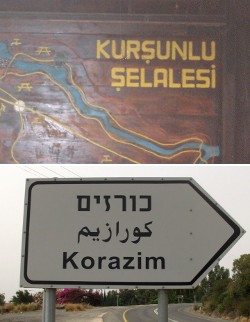
There's a lot of puzzling whre my family names comes from.
Most people believe it must be Turkish. This belief seems to be comprehensible as the word "Kurt" is used in both German and Turkish, and as Turkish names e.g. "Erdogan" or "Yildirim" sound similar. Otherwise, a Turkish man asked by my mother supposed the name as Arabic.
Googleing the word "kursidin" led me to sites in Uyghur language, which is related to Turkish. I received this explanation from an Uyghur organisation: "In Uyghur, 'kursidin' means 'from a course', like a subject."
Also, the internet contained the names "Kursidin Nur Mustada" (Indonesia) and "Syedul Amin Bin Abu Kursidin" (immigrant to Malaysia).
And I was told that "Kurzidim" would mean "three candles" or "three angels" (or similar) in Hebrew. I heard it from two persons who didn't know each other. But also two Hebrew-understanding people told me that it was wrong.
This is a list of people and places we are not related with:
Mouhanad Khorchide | | liberal islamic theologian |  |
Salman Kurshid | | Indian minister of foreign affairs |
Kurdistan | | Unfortunately-non-existing state in Middle east |
Kurşunlu | | Waterfall near Antalya (Turkey) |
Kyschtym | | Site of a nuclear catastrophe in Siberia |
Korazim | | ancient town in Israel (the bible's "Chorazin") |
Chassidim | | orthodox Jewish community |
Didim | | ancient town in Türkey |
At least it is funny to hear those people who actually try an "authentic oriental" pronounciation. On the other hand, I sometimes must hear comments like "someone who looks as aryan as you cant' be named Turkish" (er...)
So much for that, the following theories sounded more realistic:
The name should be derived from German "kurz" and Latin "idem". My grandfather told me a similar theory, he said that the family would originally come from Osnabrück and t's name would have been "Kurz". This interpretation is dubious because a family of farmers and workers didn't need Latin.
Polish speakers are reminded of the words "kura" (chicken) und "dym" (smoke). But I think that no one would call himself "chicken smoke" or "smoked chicken".
The famous linguist Dr. Udolph gave the translation "someone who always smokes his pipe". Maybe, it's true. But that pipe could never be filled with tobacco - it wasn't popular in Europe before 1600.
| 


